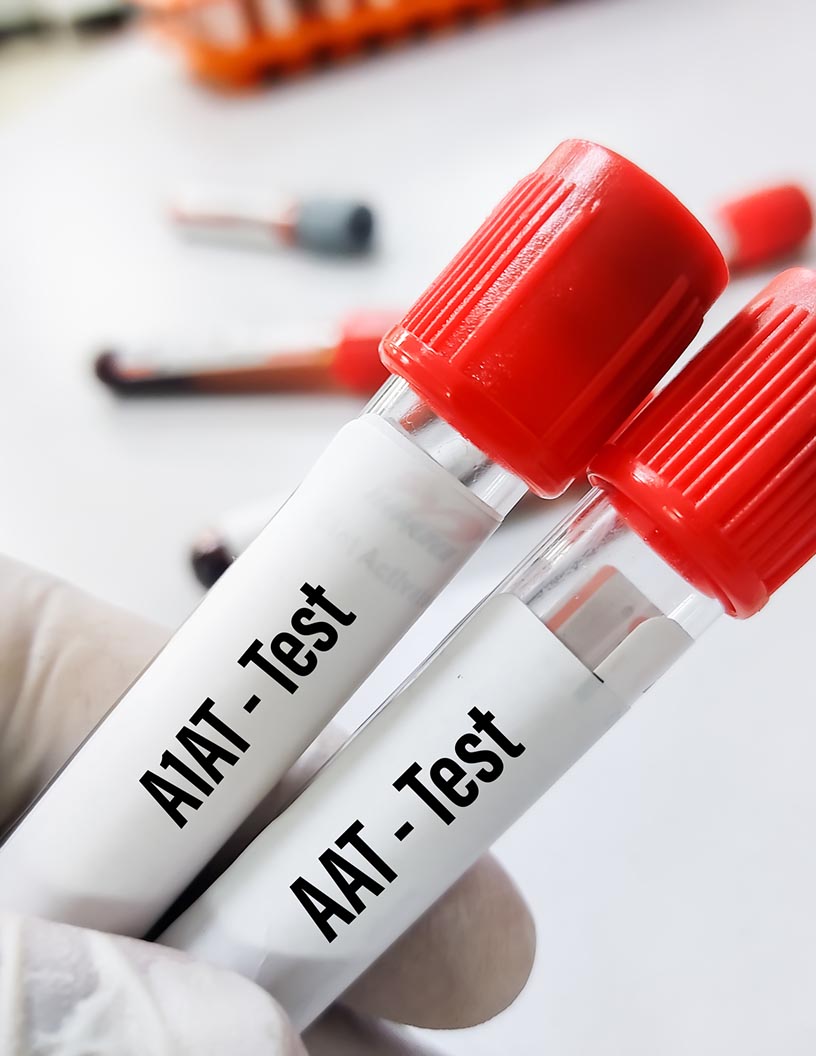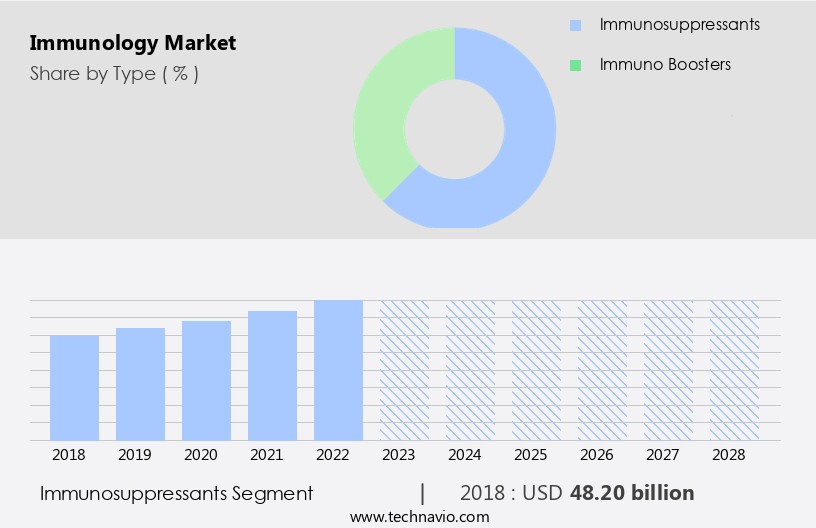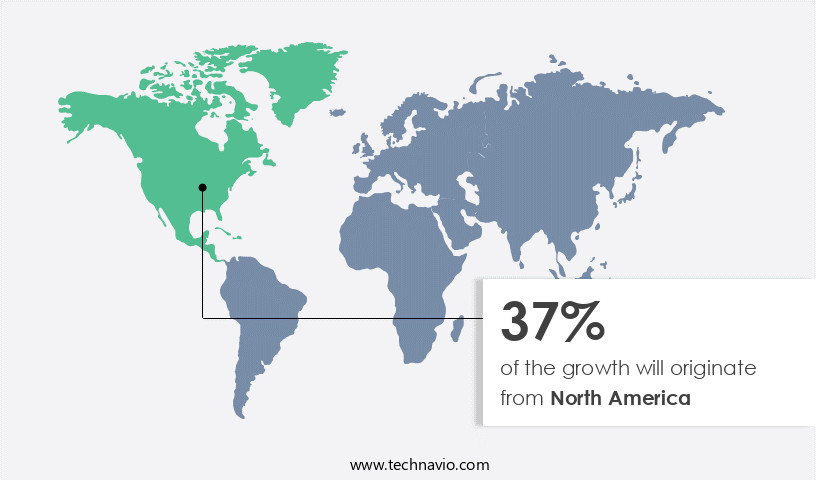Immunology Market Size 2024-2028
The immunology market size is forecast to increase by USD 65.8 billion at a CAGR of 9.45% between 2023 and 2028.
- The market is experiencing significant growth, driven by the increasing number of organ transplantations and the entry of biosimilars. The global organ transplantation rate is projected to rise, fueled by advancements in immunosuppressive therapies and increasing awareness and acceptance of organ donation. This trend presents a substantial opportunity for market participants, particularly those offering innovative solutions to mitigate the risks associated with organ transplantation and improve patient outcomes. Moreover, the entry of biosimilars is disrupting the market landscape, introducing competition and price pressure. While this presents challenges for established players, it also opens up opportunities for new entrants to capitalize on the growing demand for cost-effective treatment options.
- Companies that can differentiate themselves through superior efficacy, safety, or patient experience will be well-positioned to capture market share and thrive in this dynamic and competitive environment. In summary, the market is poised for continued growth, driven by the increasing number of organ transplantations and the entry of biosimilars. Market participants must adapt to these trends by focusing on innovation, cost competitiveness, and patient-centric solutions to capitalize on opportunities and navigate challenges effectively.
What will be the Size of the Immunology Market during the forecast period?
- The market in the United States is experiencing significant growth due to the increasing prevalence of immune-related disorders, including autoimmune diseases, allergies, and infectious diseases. The market is driven by the development of innovative therapies, such as biological medications and biosimilars, which target dysregulation of the immune system. Technologies like monoclonal antibodies, flow cytometry, PCR-based diagnostics, ELISA assays, and immune checkpoint inhibitors are transforming the diagnosis and treatment of immunological disorders, including rheumatoid arthritis, psoriatic arthritis, type 1 diabetes, and various cancers.
- Hospital pharmacies play a crucial role in the distribution and administration of these immunology therapies. The market's size and direction reflect the ongoing research and development efforts in the complexities of the immune response and the potential for new treatments. Immunology therapies are becoming increasingly important in managing immune system dysregulation and addressing the burden of immune-related disorders.
How is this Immunology Industry segmented?
The immunology industry research report provides comprehensive data (region-wise segment analysis), with forecasts and estimates in "USD billion" for the period 2024-2028, as well as historical data from 2018-2022 for the following segments.
- Type
- Immunosuppressants
- Immuno boosters
- Distribution Channel
- Hospital pharmacies
- Retail pharmacies
- Online pharmacies
- Geography
- North America
- US
- Europe
- Germany
- UK
- Asia
- China
- Japan
- Rest of World (ROW)
- North America
By Type Insights
The immunosuppressants segment is estimated to witness significant growth during the forecast period.
Immunosuppressants, also recognized as anti-rejection drugs, are a significant category of biological medications that inhibit or diminish the immune system's response. These drugs play a crucial role in organ transplantation, where the risk of rejection is high due to the body identifying the new organ as a foreign entity and launching an immunological attack. Autoimmune diseases, such as Chron's disease, inflammatory bowel disease, and arthritis, frequently necessitate their use. Immunosuppressants function by preventing a hyper-immune response in patients, shielding transplanted organs from destruction and safeguarding other body components. Targeted therapies, including corticosteroids, immunomodulators, and monoclonal antibodies, are essential components of this drug class.
Infections, cancer, and various immune-related disorders are other indications for immunosuppressants. For instance, microbes, viruses, and parasites can trigger an excessive immune response, leading to complications. In cancer, immunosuppressants are employed to minimize side effects of chemotherapy and radiation therapy. Moreover, targeted immunotherapies, such as checkpoint inhibitors, cytokines, and Janus kinase inhibitors, are increasingly being used to treat cancer and autoimmune diseases like psoriasis and multiple sclerosis. Biomarkers, molecular biology, and gene editing techniques are essential tools in the development of immunosuppressive substances. Pharmacists, academic institutions, and drug development companies collaborate to create new treatments and improve existing ones.
Reimbursement policies and systems significantly impact the use of immunosuppressants, as their high cost can limit access for patients. Immunosuppressants have side effects, including increased susceptibility to infections and allergies. Precision medicine and personalized immunotherapies are emerging trends in the field, focusing on the genetic composition of each patient to optimize treatment outcomes. The market is dominated by biotechnology and pharmaceutical companies that invest in research and development of innovative therapies, including CAR-T cell therapy, fusion proteins, and adoptive cell therapy. Immunological disorders, such as dysregulation of immune system components, can be diagnosed using tests and assays like ELISA assays, flow cytometry, and PCR-based diagnostics.
Environmental factors and genetic predisposition also contribute to immune system dysfunction. In the context of cancer, disease pathways and drug schedules is essential for effective treatment. In , immunosuppressants are essential medications that modulate the immune system's response to foreign agents and dysregulated immune responses. They have significant applications in organ transplantation, autoimmune diseases, infections, and cancer. The development of targeted therapies, personalized immunotherapies, and innovative diagnostic tools continues to advance the field of immunology, providing hope for patients with chronic illnesses and immune-related disorders.
Get a glance at the market report of share of various segments Request Free Sample
The Immunosuppressants segment was valued at USD 48.20 billion in 2018 and showed a gradual increase during the forecast period.
Regional Analysis
North America is estimated to contribute 37% to the growth of the global market during the forecast period.Technavio’s analysts have elaborately explained the regional trends and drivers that shape the market during the forecast period.
For more insights on the market size of various regions, Request Free Sample
The North American the market is projected to experience moderate growth due to the rising prevalence of chronic conditions like rheumatoid arthritis and cancer. For instance, breast cancer is one of the most common types of cancer in North America, with approximately 287,000 new invasive cases and 51,000 new DCIS cases diagnosed in US women in 2022. The integration of immunotherapies, such as immunomodulators and monoclonal antibodies, with conventional cancer treatments, like chemotherapy and radiation therapy, has shown promising results in enhancing treatment efficacy. Additionally, the immune system plays a crucial role in the development of various autoimmune disorders, such as psoriasis, ankylosing spondylitis, and multiple sclerosis.
Immunosuppressive substances, such as corticosteroids and biologics, are commonly used to manage these conditions. The market's growth is also driven by the increasing use of targeted therapies, including tyrosine kinase inhibitors and Janus kinase inhibitors, and the development of personalized medicine and precision medicine approaches. Furthermore, the market is witnessing significant advancements in diagnostic tools, such as ELISA assays, PCR-based diagnostics, and flow cytometry, which aid in the early detection and monitoring of various immunological disorders. The market dynamics are also influenced by the increasing research in gene editing techniques, gene therapies, and fusion proteins, which offer potential solutions for various immune-related disorders.
However, the market faces challenges such as the side effects of immunosuppressants and immunotherapies, antibiotic resistance, and the high cost of biologics and systemic medications. Pharmacists, academic institutions, and drug development companies play a significant role in the market, collaborating to improve drug development, optimize drug schedules, and address reimbursement policies. The market's growth is further influenced by the increasing use of online pharmacies, retail pharmacies, and hospital pharmacies, making treatments more accessible to patients. In , the North American the market is driven by the rising prevalence of chronic illnesses, the integration of immunotherapies with conventional treatments, and the development of advanced diagnostic tools and therapeutic approaches.
However, the market faces challenges such as side effects, antibiotic resistance, and high costs, which necessitate continuous research and innovation to address these challenges and improve patient outcomes.
Market Dynamics
Our researchers analyzed the data with 2023 as the base year, along with the key drivers, trends, and challenges. A holistic analysis of drivers will help companies refine their marketing strategies to gain a competitive advantage.
What are the key market drivers leading to the rise in the adoption of Immunology Industry?
- Growing organ transplantation is the key driver of the market.
- The market has experienced steady growth due to the increasing number of organ transplantations. According to recent reports, over 46,000 transplants were performed in the US in 2023, marking an 8.7% increase from the previous year. This growth can be attributed to the collective efforts of organ procurement organizations, hospitals, and the Organ Procurement and Transplantation Network (OPTN). As the demand for organ transplantations rises, so does the need for immunosuppressive drugs to prevent rejection.
- Consequently, the market is poised for significant expansion during the forecast period. The commitment to saving lives through organ donation and transplantation is a driving force behind this market trend.
What are the market trends shaping the Immunology Industry?
- Significant pipeline of immunology is the upcoming market trend.
- The market is experiencing significant growth due to the pipeline of promising immunological agents in various clinical trial stages. These agents, upon approval, will expand the therapeutic options and subsequently increase the demand for immunological treatments. According to , there are approximately 51 molecules undergoing clinical trials worldwide. Among these, 22 molecules are in Phase II, four are in Phase III, 16 are in Phase I, and the rest are in Phase I/II trials.
- One of the notable molecules in development is risankizumab (SKYRIZI) from AbbVie Inc. And Boehringer Ingelheim. The approval of new therapeutic agents not only broadens the treatment options but also increases the need for these regimens, thereby driving market growth.
What challenges does the Immunology Industry face during its growth?
- Entry of biosimilars is a key challenge affecting the industry growth.
- The global immunology therapy market is experiencing a significant shift due to the impending patent expirations of several immunological drugs. This trend, as outlined in , will result in a decrease in market value as biosimilars enter the market, offering more affordable alternatives to consumers. The BPCI Act mandates that biosimilar manufacturers notify the originator company six months prior to commercialization of their rival product upon receiving US FDA approval.
- Consequently, the entry of biosimilars poses a substantial challenge to the market, potentially hindering its growth during the forecast period.
Exclusive Customer Landscape
The immunology market forecasting report includes the adoption lifecycle of the market, covering from the innovator’s stage to the laggard’s stage. It focuses on adoption rates in different regions based on penetration. Furthermore, the immunology market report also includes key purchase criteria and drivers of price sensitivity to help companies evaluate and develop their market growth analysis strategies.
Customer Landscape
Key Companies & Market Insights
Companies are implementing various strategies, such as strategic alliances, immunology market forecast, partnerships, mergers and acquisitions, geographical expansion, and product/service launches, to enhance their presence in the industry.
3SBio Inc. - The company specializes in diagnosing and treating immune-related diseases and conditions, specifically focusing on rheumatology. Our offerings encompass a comprehensive approach to arthritis and related disorders, utilizing advanced methodologies and evidence-based practices. By prioritizing patient-centered care and continuous research, we aim to improve quality of life for those affected.
The industry research and growth report includes detailed analyses of the competitive landscape of the market and information about key companies, including:
- 3SBio Inc.
- AbbVie Inc.
- Amgen Inc.
- ANTARES PHARMA INC.
- Astellas Pharma Inc.
- Biogen Inc.
- Bristol Myers Squibb Co.
- Eli Lilly and Co.
- F. Hoffmann La Roche Ltd.
- GlaxoSmithKline Plc
- Horizon Therapeutics Plc
- ImmuNext Inc.
- Incyte Corp.
- Johnson and Johnson Services Inc.
- Merck KGaA
- Mitsubishi Chemical Group Corp.
- Novartis AG
- Pfizer Inc.
- Takeda Pharmaceutical Co. Ltd.
- UCB SA
Qualitative and quantitative analysis of companies has been conducted to help clients understand the wider business environment as well as the strengths and weaknesses of key industry players. Data is qualitatively analyzed to categorize companies as pure play, category-focused, industry-focused, and diversified; it is quantitatively analyzed to categorize companies as dominant, leading, strong, tentative, and weak.
Research Analyst Overview
The market encompasses a broad spectrum of biological medications designed to address various immune system disorders and diseases. These disorders can manifest as rare conditions or chronic illnesses, necessitating targeted therapy approaches. The biological medications include corticosteroids, immunosuppressive substances, and immunomodulators, among others. The immune system plays a crucial role in maintaining homeostasis within the body. However, dysregulation of the immune response can lead to inflammatory conditions, autoimmune diseases, and infections. Microbes, including viruses and bacteria, can cause infections, necessitating the use of antibiotics and antiviral agents. Biological medications have emerged as a dominant sector in the market due to their ability to specifically target immune system components involved in disease pathways.
For instance, monoclonal antibodies and cytokine inhibitors have shown significant promise in treating autoimmune disorders such as psoriasis, rheumatoid arthritis, and multiple sclerosis. Personalized medicine and precision medicine have gained significant traction in the market. The use of genetic composition and biomarkers in drug development has led to the creation of targeted therapies, including tyrosine kinase inhibitors and Janus kinase inhibitors. These therapies have shown promising results in treating various diseases, including cancer and inflammatory bowel disease. The market also includes various diagnostic tools, such as ELISA assays, flow cytometry, and PCR-based diagnostics, which aid in the identification and monitoring of immune system disorders.
Pharmacists and academic institutions play a crucial role in the development and implementation of these therapies and diagnostic tools. Immunotherapy, including cancer immunotherapy, has emerged as a significant area of focus in the market. Technological advancements, such as gene editing techniques and car-T cell therapy, have led to innovative therapies that harness the power of the immune system to combat diseases. Reimbursement policies and systems have a significant impact on the market. The cost of these therapies and diagnostic tools can be high, necessitating careful consideration of their economic viability and impact on patient outcomes. Biosimilars and systemic medications offer more affordable alternatives, while side effects and toxicity remain key concerns.
Environmental factors and toxic chemicals can also impact the immune system, leading to various disorders and diseases. Vaccines and immunoprophylaxis are essential in preventing the spread of infectious diseases and protecting against environmental hazards. Immunological disorders can significantly impact joint function and overall health. Corticosteroids and immunosuppressants are commonly used to manage the symptoms of these disorders, but their long-term use can lead to side effects. Targeted immunotherapies and cell-based therapies offer more specific and effective treatment options. In , the market is a dynamic and complex field that encompasses various biological medications, diagnostic tools, and therapeutic approaches.
The immune system plays a crucial role in maintaining health and preventing diseases, and its intricacies is essential in developing effective treatments and diagnostic tools. The use of personalized medicine, precision medicine, and innovative therapies offers significant potential for improving patient outcomes and advancing the field of immunology.
|
Market Scope |
|
|
Report Coverage |
Details |
|
Page number |
176 |
|
Base year |
2023 |
|
Historic period |
2018-2022 |
|
Forecast period |
2024-2028 |
|
Growth momentum & CAGR |
Accelerate at a CAGR of 9.45% |
|
Market growth 2024-2028 |
USD 65.8 billion |
|
Market structure |
Fragmented |
|
YoY growth 2023-2024(%) |
8.41 |
|
Key countries |
US, Germany, UK, China, and Japan |
|
Competitive landscape |
Leading Companies, Market Positioning of Companies, Competitive Strategies, and Industry Risks |
What are the Key Data Covered in this Immunology Market Research and Growth Report?
- CAGR of the Immunology industry during the forecast period
- Detailed information on factors that will drive the growth and forecasting between 2024 and 2028
- Precise estimation of the size of the market and its contribution of the industry in focus to the parent market
- Accurate predictions about upcoming growth and trends and changes in consumer behaviour
- Growth of the market across North America, Europe, Asia, and Rest of World (ROW)
- Thorough analysis of the market’s competitive landscape and detailed information about companies
- Comprehensive analysis of factors that will challenge the immunology market growth of industry companies
We can help! Our analysts can customize this immunology market research report to meet your requirements.




